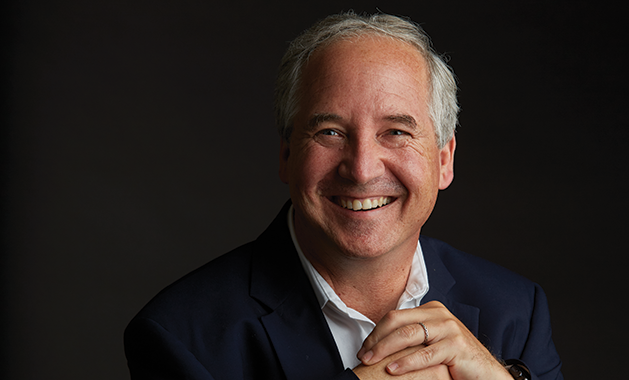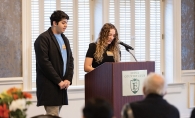
Steve Buettner, a 2017 TEDx Edina speaker, had some familiarity with the job and what to expect in his new role when he became director of media and technology for Edina Public Schools in 2010. Still, he was surprised by the community’s commitment to education for the youngest minds. He’s happy to see a community so engaged and involved in the process, and which is an advocate for schools and technology.
“I can count hundreds of volunteers that come and give their time,” Buettner says. “There have been referendums that have passed where they have given their money and they’ve also given their thoughts. It’s not uncommon to have parents contact me or the team to provide their input and we value their input.”
In the seven years Buettner has been leader of the department, he says he’s proud of the work he and his team have done. There have been challenges and change, but the goal of the department has stayed consistent.
“I’m proud of our technology vision, which has four components,” Buettner says. “It’s all about tenets of characteristics of people and not necessarily about technology. It’s the idea of how you unleash the passion for learning, not just in our kids but also for everybody.” The other three key components are realizing that teachers are the district’s greatest asset and making them more powerful than they already are, making sure to provide data and engage the community in learning, and providing good customer service to students, staff and the community.
As for challenges, Buettner says those are not unique to just technology. He says that in education there are limitless needs and limited resources. “Part of the struggle in my position is prioritizing the needs of the organization with limited resources, so that we make sure resources are going to the organization’s greatest needs,” Buettner says.
Despite these challenges, Buettner and his team have done a great job of applying technology to achieve the district’s larger mission and vision, which stresses the importance of educating all students to be responsible, lifelong learners who possess the necessary skills to thrive in a rapidly changing, culturally diverse, and global society.
“Steve has an amazing ability to recognize the power of and possibilities of technology and how technology can support students’ learning with efficient and effective approaches of implementing the needed strategies to reach the district’s various technology goals. Steve and his team will not quit until the goal has been reached,” says Ric Dressen, former EPS superintendent who oversaw Buettner’s hiring. Before his job with the district, Buettner worked in education and technology in various roles in the U.S. and in Spain. He was the manager of technical services for Osseo Area Schools, technology service manager for St. Paul Public Schools, and the director of technology for the American School of Madrid. The story of how he landed the job in Madrid is one that captures the kind of person he is and his love for adventure and new experiences.
“My wife [Kathy Kraemer] was a moderator for a listserv for international schools and saw a posting about the job,” Buettner says. “I wrote the headmaster on a whim and within 24 hours we were engaged in discussion and three weeks later we were in Spain. What I didn’t realize is that there is a worldwide network of American/international schools that serve expats and foreign families. It is different in that it is a traditional American K-12 education, but it had an incredible mix of cultures and races in the student population.”
In the early 1990s, Buettner began going on biking expeditions with his brother Dan, the New York Times best selling author of books including The Blue Zones: Lessons for Living Longer from the People Who’ve Lived the Longest, in countries such as Tunisia, South Africa, Argentina, and Russia. The brothers hold two Guinness World Records for transcontinental cycling. They taped their expeditions and were approached by a company called MECC in the late 1990s to adapt the footage into educational computer games that would allow schools to use them as multi-disciplinary teaching themes.
While on the African expedition, dubbed AfricaTrek, Buettner also shot video footage for CNN Newsroom that was used for updates by the network and also by WCCO. When the two brothers returned home, they were approached by Twin Cities Public Television to make a documentary about their expedition using the footage, along with interviews and graphics that were created afterward. The documentary won a regional Emmy for best documentary.
His biking expeditions taught him valuable life lessons and have been experiences that he looks back on fondly. “I think my bicycling expeditions and my previous work really taught me about setting goals and being open to challenges,” Buettner says. “I also learned a lot about how to communicate with a team to achieve a goal, and that if you listen to people, there is all kinds of wisdom to be gained.”
Buettner credits his parents for instilling a love of adventure in the two brothers. When he was 11 years old, his father started taking the family to the Boundary Waters Canoe Area. There, the boys learned the essentials of backpacking and camping. “At the time, I was pretty bored with the experience but now I look back on it and I see how critical it was in the formation of my love for learning and for exploring,” Buettner says.
Now, Buettner looks forward to the work ahead as the district modifies their learning spaces. He stresses that the goal is to ensure that technology is a positive force in education and to mitigate the negative aspects of technology with students.
Watch Buettner's Tedx Talk ut AfricaTrek on YouTube here.









